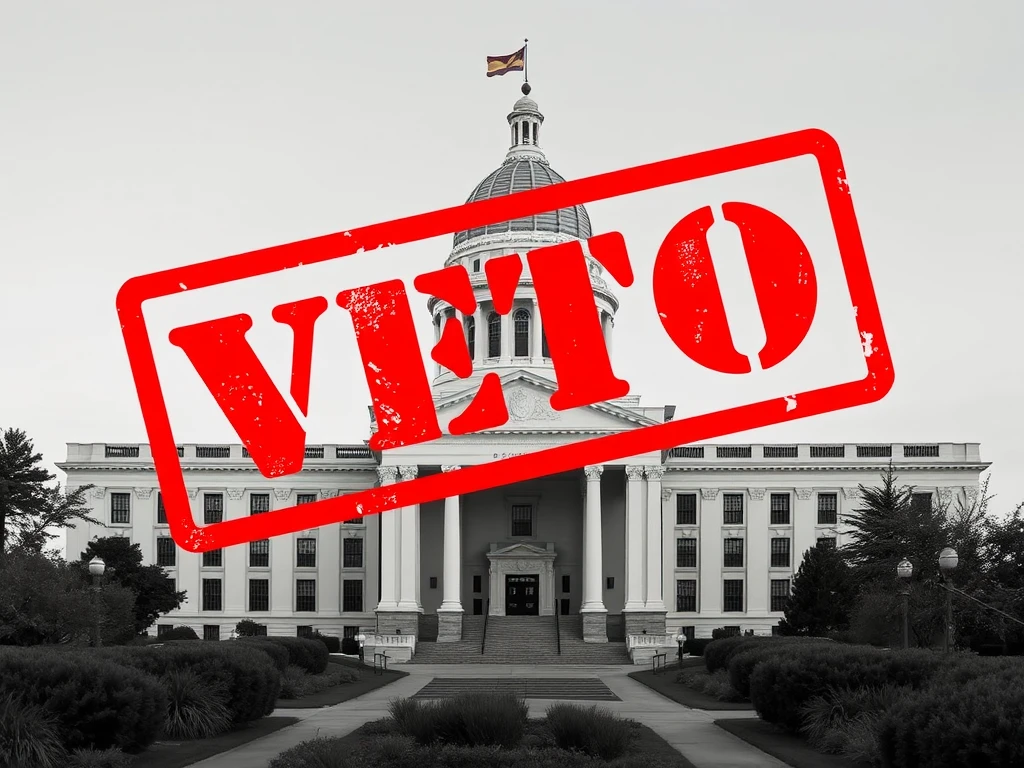Crucial Arizona Bitcoin Reserve Bill Vetoed by Governor Katie Hobbs

Big news out of Arizona for anyone following the intersection of cryptocurrency and state finance! A significant push to allow Arizona to hold Bitcoin as part of its official reserves has hit a roadblock. This move, which aimed to make Arizona a pioneer among US states in adopting such a policy, was formally shut down by Governor Katie Hobbs.
Arizona Bitcoin Plan Faces Gubernatorial Veto
Governor Katie Hobbs has officially vetoed the proposed legislation that would have paved the way for Arizona to include Bitcoin in its state reserves. The bill, known as the Digital Assets Strategic Reserve bill, sought to permit the state to invest certain seized funds into Bitcoin (BTC) and establish a reserve managed by state officials. The veto was confirmed on Friday, according to updates from the Arizona State Legislature.
In a statement directed at Arizona Senate President Warren Petersen, Governor Hobbs explained her decision:
“Today, I vetoed Senate Bill 1025. The Arizona State Retirement System is one of the strongest in the nation because it makes sound and informed investments. Arizonans’ retirement funds are not the place for the state to try untested investments like virtual currency.”
Her primary concern centers on using public funds, particularly those intended for retirement systems, for what she considers “untested investments” like virtual currency. The bill had previously passed the state House on April 28 with a 31-25 vote in favor.
Why Did Governor Hobbs Veto the Bitcoin Reserve Bill?
The core reason cited by Governor Katie Hobbs for vetoing the bill is the perceived risk associated with using public funds for volatile and “untested assets” like Bitcoin. She emphasized the importance of maintaining the strength and stability of the Arizona State Retirement System through sound, informed investments.
Key points from her reasoning:
- **Untested Investment:** Bitcoin and other digital assets are viewed as novel and lacking the long track record of traditional investments typically held in state reserves.
- **Public Fund Risk:** There’s a reluctance to expose public money, especially retirement funds, to the price volatility inherent in cryptocurrencies.
- **Investment Stability:** The focus remains on maintaining the established strength of the state’s financial systems through conventional, low-risk investment strategies.
It’s also worth noting that Governor Hobbs had previously indicated she might veto legislation not linked to a separate bipartisan agreement on disability funding, adding another layer to the political context of this decision.
What Happens to Other Digital Assets Legislation?
While this specific bill (SB1025) regarding the state’s general reserves is vetoed, another related piece of legislation is still pending. A companion bill, SB1373, proposes allowing the state treasurer to allocate up to 10% of Arizona’s rainy-day fund into digital assets, including Bitcoin. This bill has not yet reached a final vote and its fate remains uncertain following the veto of SB1025.
Arizona isn’t alone in exploring or rejecting such proposals. Several other US states have seen similar efforts stall or fail:
- Oklahoma
- Montana
- South Dakota
- Wyoming
In contrast, North Carolina recently saw its Digital Assets Investment Act pass the House on April 30. This bill would permit the state treasurer to invest up to 5% of certain funds into approved cryptocurrencies, and it has now moved to the state Senate for consideration.
The Broader Push for a State Bitcoin Reserve
These state-level initiatives to create a Bitcoin Reserve reflect a broader conversation happening in the US, even at the federal level. Prominent figures, including former President Donald Trump and some Republican lawmakers, have voiced support for the government exploring or holding digital assets.
For instance, Trump signed an executive order in March proposing a “Strategic Bitcoin Reserve” and a “Digital Asset Stockpile.” While the scale and purpose differ greatly between a state-level reserve of seized funds and a potential federal stockpile, the underlying idea of government holding digital assets is gaining traction in political discourse.
Conclusion: A Setback for Arizona’s Crypto Ambitions
Governor Katie Hobbs’s veto represents a clear setback for those hoping to see Arizona become the first US state to formally incorporate Bitcoin into its State Reserves. The decision underscores the cautious approach many state leaders are taking when it comes to integrating volatile digital assets into public financial systems, prioritizing perceived stability over potential high returns. While one bill is dead, the discussion around digital assets and state finance in Arizona, and across the US, is far from over, especially with a companion bill still pending and other states like North Carolina moving forward with their own exploration.










